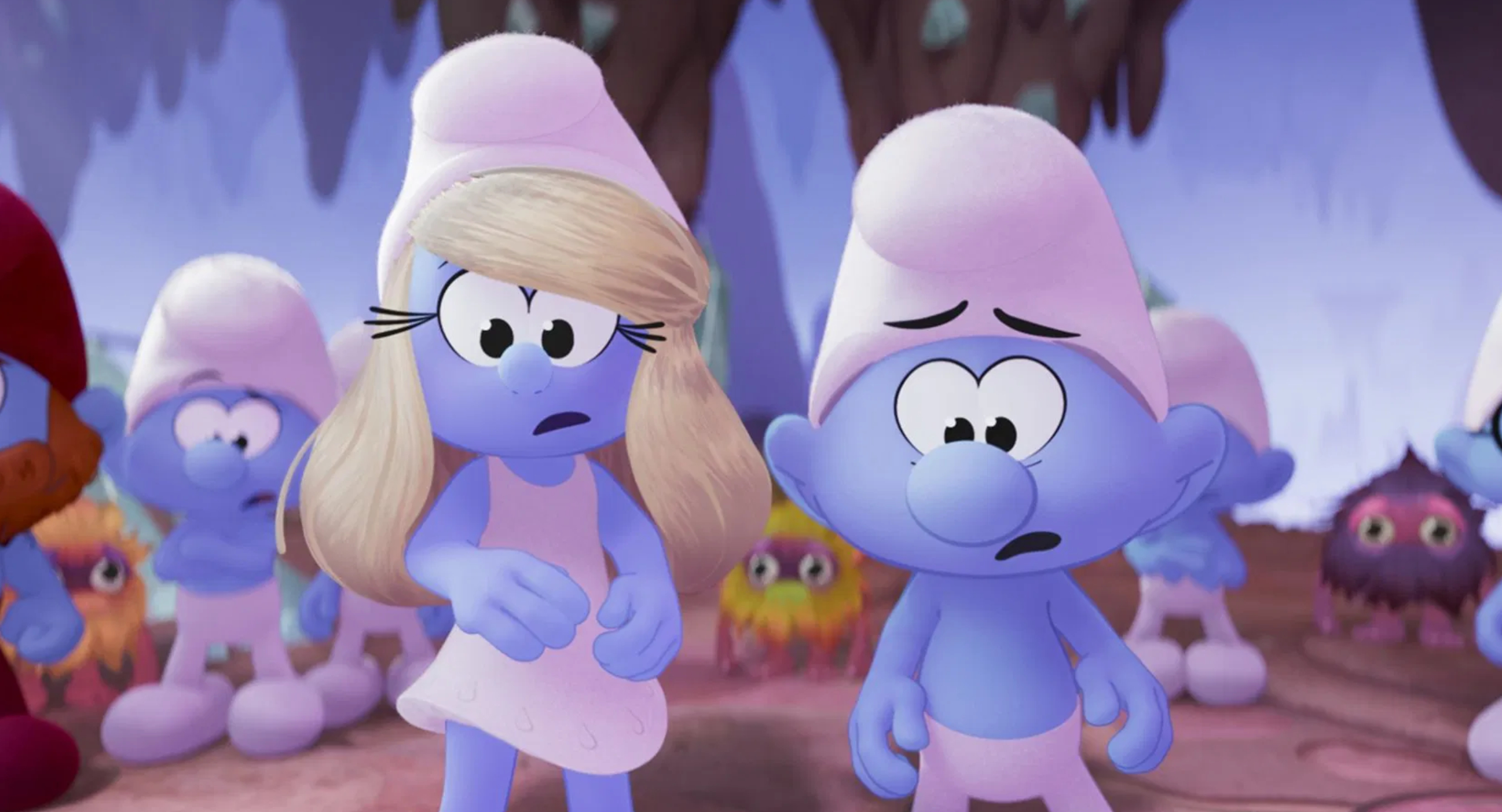Smurfs – Film Review
Published July 16, 2025

Really? We’re doing this again? Smurfs arrives with the thunderous fanfare of celebrity voices, flashy musical numbers, and a desperate attempt to modernize a beloved classic. Directed by Shrek the Third’s Chris Miller and penned by Pam Brady (South Park, Team America: World Police), this new iteration of the little blue forest-dwellers promises reinvention but delivers an exhausting mess of tonal confusion, overproduction, and hollow sentimentality.
Despite a stacked voice cast headlined by Rihanna—who also serves as producer—and featuring James Corden, John Goodman, Nick Offerman, JP Karliak, and Sandra Oh among others, the film rarely finds emotional or comedic footing. Instead, Smurfs becomes a noisy pastiche of recycled plot beats, aggressive pop culture winks, and misfired attempts at heartfelt storytelling.
In this reboot, when Papa Smurf (voiced with gruff but warm sincerity by John Goodman) is kidnapped by the nefarious wizard duo Gargamel and his long-lost brother Razamel (both voiced by JP Karliak), Smurfette (Rihanna) takes charge and leads a band of Smurfs into the human world to rescue him. It’s a familiar hero’s journey, garnished with magical stakes and pop-fantasy flair. But the story never quite gels.
Instead of leaning into the charming simplicity of the original comics or even the whimsy of earlier adaptations, this reboot burdens itself with forced lore expansion and a cosmic convergence that borders on parody but plays itself straight. Papa Smurf isn’t just a wise leader; he’s apparently the key to stabilizing the balance of magical energy between realms. Why? It’s unclear, and by the third convoluted exposition dump, you may stop caring.
As a musical fantasy comedy, Smurfs should have at least one thing going for it: music. And it certainly has music—too much of it. Rihanna provides several original songs, some with her usual pop flare, but the lyrics are painfully literal and oddly out of sync with the emotional beats of the film. It’s so sad because, of course, as we know, Rihanna is an extremely talented musician, but she feels like she’s barely even trying here.
These musical numbers, while competently produced, frequently halt the momentum of the film or feel like contractual obligations. They’re catchy in the most artificial way, engineered more for potential TikTok sound bites than actual narrative relevance. Worse still, they contribute to the film’s overwhelming sensory overload—rapid editing, rainbow vomit visuals, and glitzy transitions that feel more like a YouTube kids’ compilation than a cohesive theatrical film.
The characters, meanwhile, are largely underwritten and defined by a single trait—something the original comics played for charm but the film exaggerates to irritating extremes. James Corden voices “No Name Smurf,” whose performance leans heavily on Corden’s usual shtick—broad, smug, and peppered with winking sarcasm. It wears thin quickly.
Rihanna’s Smurfette fares little better. Though she gives a committed performance, her vocal tone lacks the dynamism to carry the character through the emotional peaks and valleys the script demands. She sounds more like a celebrity reading lines than a fully immersed character. There’s an earnest attempt to empower Smurfette as a leader, but the film’s chaotic tone and scattershot plotting undermine those efforts. The villains, Gargamel and Razamel, are voiced with admirable effort by JP Karliak, but even their double act becomes tiresome.
One of the most baffling aspects of Smurfs is how it squanders its cast. Sandra Oh, Maya Erskine, Amy Sedaris, and Octavia Spencer have mere lines of dialogue as background Smurfs, their talents lost in the auditory soup.
The film is polished but cluttered. The CGI-rendered Smurfs are detailed and expressive, but they’re rarely allowed to inhabit naturalistic or aesthetically pleasing spaces. The world they travel through is a garish blend of digital noise, filled with glowing mushrooms, rainbow portals, and swirling energy orbs. It’s fantasy turned to sugar rush, lacking the hand-crafted charm or visual discipline of better animated fare.
More crucially, the emotional core is missing. The film tries to develop themes of identity, unity, and courage—but they’re delivered with such heavy-handedness and incoherent pacing that none of it lands. The movie also doesn’t trust its quieter moments, constantly puncturing them with jokes or musical interludes.
In its effort to appeal to everyone—from nostalgia-driven adults to young kids to fans of musical animation—Smurfs ends up pleasing no one. It lacks the wit of Shrek, the heart of Trolls, or even the nostalgic simplicity of the earlier Smurfs films. While the reboot may generate short-lived excitement for its novelty and big-name cast, it’s hard to imagine it having lasting impact.
For a film that hinges so much on the idea of identity, Smurfs itself suffers from an identity crisis. Is it a pop musical? A fantasy epic? A fourth-wall-breaking comedy? Whatever it’s trying to be, it never coalesces into anything more than a corporate product disguised as storytelling.
